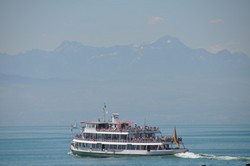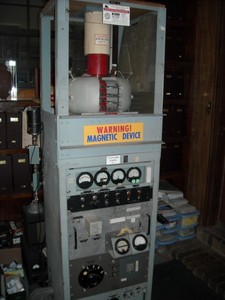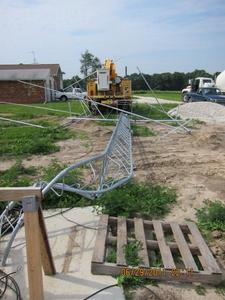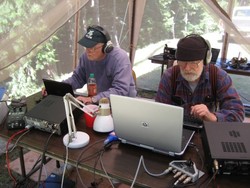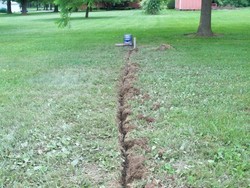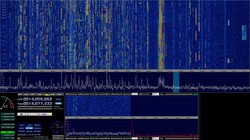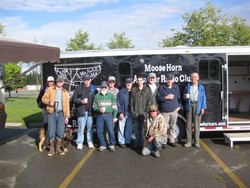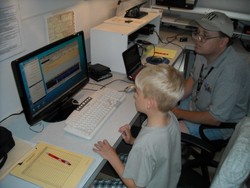 July 6, 2011 Editor: Ward Silver, NØAX | |||||||||
IN THIS ISSUE
NEW HF OPERATORS - THINGS TO DO The annual midsummer night's dream of the IARU HF World Championship is a lot of fun with its summertime propagation (watch 20 at night!), 24-hour format (think the Le Mans road race), and dual-mode operating. It's an exciting change and a good opportunity to keep your skills sharp after Field Day. The following weekend features several digital contests to try, as well! BULLETINS There are no bulletins in this issue. BUSTED QSOS Bill N5RKD notes that the Chinese radio telescope mentioned last time will be 500 meters across and Arecibo is 305 meters across. CONTEST SUMMARY Complete information for all contests follows the Conversation section July 9-10
July 16-17
Bob W5OV just got back from the big Friederichschafen hamfest in Bavaria and posted a big photo album of new products, shots of the goings-on in the Array Solutions booth, beautiful pictures of the countryside, and so forth. The most notable new item was a solid-state 800-watt amplifier from Acom. It apparently includes a tuner and sounds very attractive. No word on availability in the US. The August issue of the RSGB's Radcom will feature The Joy Of Contesting 2.0 by well-known DXer and contester Mark MØDXR. It's a good read and makes a good example of how competitive operating - i.e. radiosport - makes a very attractive entry to ham radio. (Thanks, Tim K3LR) Regarding the new Russian prefix assignments mentioned in the previous issue, Joe W4TV notes a potential problem. "Most contests recognize the ARRL DXCC list as the basis for multipliers. The DXCC List treats some of the areas mentioned as being in Europe as Asiatic Russia." Joe advises waiting for some action by the DXCC Manager before making any changes in your CTY files.
Felipe PY1NB has recently created a set of statistics tools on the DX Watch website that uses spotting network data. The tools include Top Spots Per Band and Continent, Top Self-Spotters, and an interesting Lid Fest. I guess there is no shortage of data for that last one! Fred KE7X has written a new book about the Elecraft K3, "The Elecraft K3: Design, Configuration, and Operation." Even if you are not a K3 owner but are interested in this top-flight radio, Fred's presentation make for great radio reading! (Thanks, Ken KØPP) Here's an interesting website that helps you figure out what all those strange logos are that seem to be plastered all over every piece of electronics. We all recognize the Underwriter Labs mark, but those others? They must mean something, right? Bueller? I assume NOM doesn't mean "good to eat"! The largest number of transmitters I encountered in a Field Day exchange this year was 25 for the W3AO "humungotron" effort. Always WAY up there, receiving that exchange never fails to raise an eyebrow or bring on a stare of disbelief on the other end of the QSO as the possibilities are considered. If you'd like to have a look at what such an effort entails, have a look at N3ALN's photo album from the weekend. It makes me tired just to look at it! Even is 25 seems like a big number, consider doubling it to 50! The W3AO team hit that mark in 2004 and you can watch the operation on the video, "The Last BIG Field Day" that can be purchased from Amateur Radio Video News (ARVN) for a reasonable cost. (Thanks, Tim K3LR and Gary KN4AQ) Web Site of the Week - In this faster-faster-faster world, something with a mission of going slow, slower, slowest certainly is attention getting! Such is the Clock of the Long Now - a clock designed to tick once every year for 10,000 years! (The cuckoo is really, really patient...) The Long Now Foundation just received an investment from Jeff Bezos and may be able to start building the clock "soon", although I suppose that's a relative term! WORD TO THE WISE Invitation - the August 21st Rookie Roundup will be using RTTY for the first time. New hams may be more familiar with computer technology and so may be naturally interested in digital contesting, more than voice or Morse. Why not invite a new ham over to take part? Now is the time to make the invitation so that it can be worked into the busy summer months. Dennis W1UE has a blog underway from the Bulgarian LZ HF Championship that ran on July 2nd. Several US teams took part and as of editing this issue, the final finishing places haven't yet been announced.
EME'ers are well-acquainted with the various "wobbles" of the Moon as it travels along its orbit. Here's a visualization in the form of a time-lapse video from the Goddard Space Flight Center. It uses data from the Lunar Reconnaissance Orbiter to compress one month into 12 seconds and one year into 2.5 minutes. (From the AMSAT Weekly Bulletin, ANS-177) Cory WA3UVV found a scrolling license plate frame online. He suggests trying messages such as "Follow me to Field Day". With a ham license plate, it could be a novel form of PR for Amateur Radio! Another space-related animation depicts key events of NASA's Mars Science Laboratory mission, which will launch in late 2011 and land a rover, Curiosity, on Mars in August 2012. Sooner or later these are going to have a ham radio on them and then will they count as a multiplier? (From the AMSAT Weekly Bulletin, ANS-184) Field Day operators who dealt with the wrath of Donner and Blitzen this past weekend may wish to take a gander at this art installation and consider the possibilities! Old-time QSL aficionados will enjoy this very cool story about Otto Eppers, a guy who drew the cartoons for a bunch of those old cards.
Curt K9AKS has been keeping 6 meter stats and he reports that of the fourteen stations who worked at least 280 grids in any year on 6 meters, eight did so in 2011. Four more stations followed with at least 268 grids in 2011. The very highest totals, 337, 314 and 310, however, were achieved in 2010. In fact, the highest thirteen grid totals (over 280) were all worked in either 2010 or 2011. A couple of pretty good years on six - very widespread openings brought high grid totals. Eight stations claimed over 1200 QSOs on 6 this year, but none over 1500 where the top four all time totals still reside. Four of the top ten all-time QSO totals are claimed for 2011. The trends are clear; in years with good conditions, grid and QSO totals will continue to rise. All of the results, certificate and plaque winners for the 2010 Ontario QSO Party are now available on the OQP website. PDF certificates are available and plaque winners will receive their prize by mail. A special thanks to compiler-in-chief, Bob VE3KZ. (Thanks, Don VE3XD) OPERATING TIP It has been observed that many Field Day operators tended to run their pileups like a traffic net. For example, a caller would be acknowledged without giving an exchange, leading to an extra round of communications in every contact. For example,
While this is OK on a directed net, it's not efficient during Field Day. Similarly, calling a station and giving the full exchange is a way to check into a traffic net but doesn't work well otherwise. So we have some mentoring to do about effective technique. If you don't think this is a significant waste of time, consider having to say the extra back-and-forth 1000 times in a row before you could begin regular operation! Jim W6RMK reminds us of the ubiquitous and inexpensive "grounding bar" used inside a circuit breaker box. Each bar has plenty of holes with clamp screws on each one. Used with an anti-oxidation compound, these make great grounding busses for radials and ground wires.
And as far as laying those radials...why dig when your lawn will bury the radials for you? Cut your grass very short - then within hours lay the radials by hand, held down by galvanized landscape pins (a short piece of galvanized wire bent double works just fine) and with the end of each wire wrapped around a pin pushed deep. Set the mower a bit higher for the next few cuttings. Water to keep the sod growing at a fast rate - if needed. In four weeks or so all radials will self-bury and be gone under the sod. After five years the radials are down about 6 inches - all on their own. (Thanks, Tim K3LR) Here's a video tour of a professional PC board manufacturer (Advanced Circuits). If you ever wanted to know just how it's done, take this tour and listen to the explanation! Microwave Journal just ran an informative article on the materials used to make cables. Food for thought! Julius N2WN had to pull some ground rods while relocating a couple of verticals. He uses copper tubing but this would work with rods too. Take a pipe wrench and gently break the rod loose by twisting back and forth. Once loose, apply a slight upward pressure and basically "unscrew" the rods from the ground.
The current issue of Nuts and Volts magazine includes a "Bat Detector" ultrasonic receiver. What does this have to do with radio? It contains a nice discussion of heterodyning in a different context, for one thing. Also, the use of ultrasonics could create an interesting parallel to radiosport, using different frequency ranges and a simple ultrasonic transmitter, no licenses required! Technical Web Site of the Week - Tapped antenna loading coil design is aided by two online calculators. The first one estimates the coil inductance value for a given frequency, radiator length, and position of the coil along the radiator. The second gives you the number of windings you'll need for a given coil diameter, length, and given inductance value. (Thanks, Pete W1PNS) It's ALL Multi-op Wasn't Field Day fun? Even for the dyed-in-the-wool single-ops, the annual Field Day cooperative adventures and misadventures are a great antidote to the "all by myself" perspective. I think that's one reason why yesteryear's great W1ICD QST covers of June and July were so resonant with so many. Team building and planning, followed by the inevitable collision with reality, are such a deep part of Amateur Radio. And if it can be humorous and fun along the way, well, who's to quibble with that?
Sitting around in one of the few remaining dry spots on Saturday night with the rest of the night owls of the St Charles Amateur Radio Club (KOØA) and waiting for the barrage of thunderstorms to pass us by, it was an opportunity to share some stories and a few laughs. Some of us were brand-new to the game and others old hands, but we were all sharing a common goal and had our shoulders to the same wheel. There were many hands to share the set up and just as many to take it all down again on Sunday. The memories of that weather-filled night won't distinguish between Tech, General, and Extra. John Sluymer, VE3EJ, in his recent CQ Contest Hall of Fame acceptance speech stated as much by recounting just how many of his achievements depended on more than just himself. So many times through the speech, he came back to "again, multiop." Although recognized for his personal achievements, John richly deserves his position on the HOF list even more because of his acknowledgement that all of us get here with many helping hands.
Even if we send in our logs as "Single-Op" in a contest, it's more than likely that more than one person was involved in getting a station going. Family members pitch in - or help make space in your life for you to do the work. Antenna-raising work parties - think "Seven Beams for Seven Brothers" - are as fundamental a part of ham radio as you can get. And then there are the after-meeting-meetings when tips and tricks and troubleshooting techniques are traded. No, there's little in our stations that is truly a single-op effort. Certainly, it would be a lonely hobby without all of you out there. Thanks for helping your fellow hams and almost-hams and going-to-be-hams. Maybe Marconi did it himself but even Guglielmo needed a pair of ears on "the other end" to receive that first trans-Atlantic "S". 6 July through 19 July 2011 An expanded, downloadable version of QST's Contest Corral in PDF format is available. Check the sponsor's Web site for information on operating time restrictions and other instructions. HF CONTESTS IARU HF World Championship--Phone,CW, from Jul 9, 1200Z to Jul 10, 1200Z. Bands (MHz): 1.8-28. Exchange: RST and IARU zone. Logs due: 30 days. Rules SNS and NS Weekly Sprints--CW, from Jul 8, 0200Z to Jul 8, 0300Z. Bands (MHz): 1.8-14. Exchange: Serial, name, and S/P/C. Logs due: 2 days. Rules FISTS Summer Sprint--CW, from Jul 8, 2000 EDT to Jul 8, 2400 EDT. Bands (MHz): 3.5-28. Exchange: RST, S/P/C, name, FISTS number or pwr. Logs due: 30 days. Rules Straight Key Weekend Sprint--CW, from Jul 10, 0000Z to Jul 10, 2359Z. Bands (MHz): 1.8-28, 50. Exchange: RST, QTH, name, member number. Logs due: 5 days. Rules QRP ARCI Summer Homebrew--CW, from Jul 10, 2000Z to Jul 10, 2400Z. Bands (MHz): 1.8-28. Exchange: RST, S/P/C, QRP number or power. Logs due: Aug 12. Rules CWops Monthly Mini-CWT Test--CW, from Jul 13, 1300Z to Jul 14, 0400Z and See website, See website to , See website. Bands (MHz): 3.5-14. Frequencies: Multiple operating periods, twice monthly on 2nd and 4th Wed, 18 to 28 kHz above band edge. Exchange: Name and member number or S/P/C. Logs due: 2 days. Rules DMC RTTY Contest--Digital, from Jul 16, 1200Z to Jul 17, 1200Z. Bands (MHz): 3.5-28. Exchange: RST and serial. Logs due: Aug 18. Rules Feld-Hell Telephone Sprint--Digital, from Jul 16, 1600Z to Jul 16, 1800Z. Bands (MHz): 1.8-28. Frequencies: Monthly on 3rd Saturday. Exchange: RST, S/P/C, Feld-Hell member nr or age. Logs due: 7 days. Rules North American QSO Party RTTY--Digital, from Jul 16, 1800Z to Jul 17, 0600Z. Bands (MHz): 3.5-28. Exchange: Name and S/P/C. Logs due: 14 days. Rules Russian Radio Team Championship--Phone,CW, from Jul 17, 0700Z to Jul 17, 1459Z. Bands (MHz): 7-28. Exchange: RS(T) and ITU zone or 3-letter code. Logs due: Jul 18. Rules CQC Great Colorado Gold Rush--CW, from Jul 17, 2000Z to Jul 17, 2159Z. Bands (MHz): 14. Exchange: RST, serial, category, CQC member nr. Logs due: 30 days. Rules Run For the Bacon - Monthly--CW, from Jul 18, 0100Z to Jul 18, 0300Z. Bands (MHz): 1.8-28. Exchange: RST, S/P/C, Flying Pig nr or power. Rules VHF+ CONTESTS CQ WW VHF Contest--Phone,CW,Digital, from Jul 16, 1800Z to Jul 17, 2100Z. Bands (MHz): 50,144. Exchange: 4-digit grid square. Logs due: Sep 1. Rules Straight Key Weekend Sprint--CW, from Jul 10, 0000Z to Jul 10, 2359Z. Bands (MHz): 1.8-28, 50. Exchange: RST, QTH, name, member number. Logs due: 5 days. Rules LOG DUE DATES 6 July through 19 July 2011 July 10 - WAB 50 MHz Phone July 12 - REF DDFM 6m Contest July 13 - ARRL June VHF QSO Party July 15 - His Maj. King of Spain Contest, SSB July 16 - VK/Trans-Tasman 160m Contest, Phone July 18 - Kid's Day Contest ARRL Information Click here to advertise in this newsletter. Your One-Stop Resource for Amateur Radio News and Information ARRL membership includes QST, Amateur Radio's most popular and informative journal, delivered to your mailbox each month. Subscribe to NCJ - the National Contest Journal. Published bimonthly, features articles by top contesters, letters, hints, statistics, scores, NA Sprint and QSO Parties. Subscribe to QEX - A Forum for Communications Experimenters. Published bimonthly, features technical articles, construction projects, columns and other items of interest to radio amateurs and communications professionals. Free of charge to ARRL members: Subscribe to The ARRL Letter (weekly digest of news and information), the ARES E-Letter (monthly public service and emergency communications news), Division and Section news -- and much more! ARRL offers a wide array of products to enhance your enjoyment of Amateur Radio. Visit the site often for new publications, specials and sales. Donate to the fund of your choice -- support programs not funded by member dues! ACKNOWLEDGEMENTS ARRL Contest Update wishes to acknowledge information from WA7BNM's Contest Calendar and SM3CER's Contest Calendar. | |||||||||
